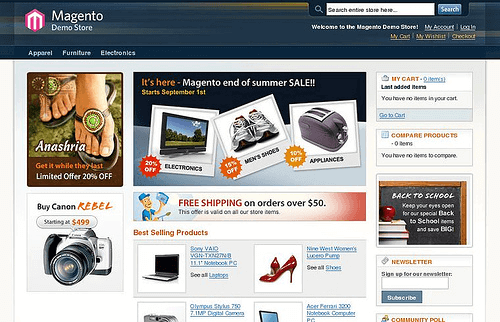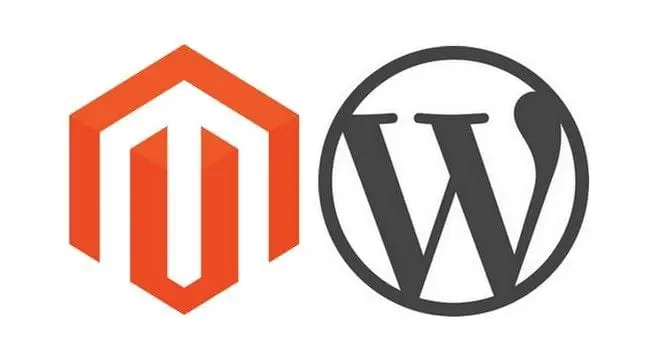When choosing an eCommerce solution for your business, you will have a wide range of platforms to choose from. Magento and Opencart are two of the most powerful eCommerce solutions available and are therefore the platforms businesses often struggle to choose between. Here we will provide a comparison of Magento and Opencart to help you decide on the right solution for your business.
About Magento
Magento is an industry-leading eCommerce platform used by the likes of Nike, Rosetta Stone and Nespresso. The solution provides merchants with full control over their eCommerce store and boasts a wide range of powerful features that offer great functionality. From easy inventory management to multi-store options and mobile commerce, Magento has everything you need to build a thriving eCommerce store.
Magento’s not only the ideal solution for small eCommerce store owners and developers but also large businesses and enterprises. There are currently two editions of Magento; Magento Community and Magento Enterprise, both of which are designed to meet different business needs and budgets.
Magento Community edition is flexible, open source software that is free to download, making it suitable for small to medium sized businesses. Magento Enterprise is designed for larger organisations and comes with an extensive range of powerful features. Prices start from $15,550 per month.
About Opencart
Like Magento, Opencart is also open source, PHP based eCommerce software. It is designed to help business owners set up their online stores and manage their operations cost effectively. Opencart is known as a smart eCommerce solution and is popular with small to medium sized businesses.
Magento vs Opencart: Which is easier to use?
Both Magento and Opencart require hosting, so before you can install the software, you will need to make sure you buy an appropriate hosting package. Always check that the host has experience in hosting Magento or Opencart prior to your purchase, as if they don’t, it can lead to major problems further down the line.
As for installation itself, both eCommerce solutions are fairly straightforward to install. With Opencart there are just a few simple installation steps to follow, enabling you to launch your store quite quickly. Magento is slightly more complicated to set up, due to its extensive features. With this in mind, we recommend seeking help from a Magento agency if you are unsure about how to install Magento.
In terms of usability, Opencart is pretty simple. Its user-friendly control panel is designed so that new users can set up their stores without needing to consult the experts. There are also plenty of tutorials within the Opencart developer community for users to follow.
Magento has a slightly steeper learning curve due to its complex features, however once you’ve familiarised yourself with it, you’ll have no problem running your store. To get started with Magento, we highly recommend working with an experienced Magento developer who will not only help you to set up and customise your eCommerce store but also show you how to get the most out of it.
Magento vs Opencart: Customisation and functionality
The good news is that both Magento and Opencart are highly customisable. Opencart has over 9,000 free and paid modules and templates, which can be used to customise and enhance the functionality of your eCommerce store. These can be downloaded directly from the extension directory of the official Opencart website.
Magento also boasts a large number of modules and themes, available from the Magento Connect store. These can be used to change the look of your eCommerce site and boost its functionality. There’s pretty much a module for everything you can think of. Like Opencart, some of Magento’s themes and modules are free, whereas others have to be paid for.
In terms of out of the box features offered by Magento and Opencart, Magento is the clear winner. There are few eCommerce platforms that can stand up to Magento in terms of features. The software not only gives business owners full control of their design and layout (an area limited by Opencart) but also the option to configure the Magento SEO settings for their stores. Magento boasts SEO friendly URLs and useful tagging options, whereas Opencart offers little in the way of SEO.
Magento also makes it very easy for users to manage their stores and upsell their products. The inventory system provided by Magento is far better than Opencart’s, so you have to decide how important this is to you.
Magento vs Opencart: Cost
Even though both Opencart and Magento Community Edition are free to download, there are some costs involved. For example, you will need to consider the cost of hosting, any premium modules or themes you use and any outside help you require to develop your store.
Being realistic, you are likely to spend more on a Magento eCommerce store than on Opencart, as unless you have development experience; you are going to need to hire a Magento developer to give you a hand in setting up and customising your store.
Having said this, you also need to consider future migration costs. Opencart’s features are somewhat limited so can you be 100% sure you’re not going to want to migrate to Magento in a couple of years’ time? If the answer is no, then you’re better off paying the extra to go with Magento now, rather than having to pay migration fees and the additional development costs later.
Which is the best choice?
There’s no eCommerce system out there that is considered to be one-size-fits-all, so it’s all about finding the solution that best fits your needs. When choosing between Magento and Opencart, you need to decide what’s most important to you.
If you have a small budget then Opencart is likely to make a more sensible choice. It’ll have all the features a start-up company needs and only requires a small investment, compared to Magento.
On the other hand, if you are after a professional system for eCommerce, then there’s no better choice than Magento. Where Opencart falls short is exactly where Magento thrives. You’ll be able to take your business much further with Magento and benefit from its extensive features. There’ll be no restraints on what you can do. Your options will be limitless.

A selection of our older posts, written by various members of the team between 2015 to 2021.











0 Comments